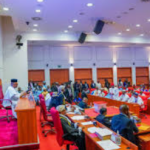By Lara Adejoro
Professionals in the health sector of the country have called for actionable plans to translate efforts being made by President Bola Tinubu’s administration into significant changes in health institutions in the country.
President Tinubu, on assumption of office on May 29, 2023, indicated plans to transform the health sector and stop the brain drain among health professionals.
The Coordinating Minister of Health and Social Welfare, Muhammad Pate, during the ministerial briefing to mark the first anniversary of the administration on Friday, also reeled out efforts to transform the sector, including revamping health institutions in the country.
In telephone discussions with our correspondent, medical practitioners agreed that President Tinubu had made efforts in repositioning the health sector, but lamented that the efforts were yet to translate into significant changes.
President of the Nigeria Medical Association, Prof Bala Audu, said the ministers of health and social welfare were injecting creativity and innovation into the healthcare sector.
“We expect that if they continue along this path, the health sector in Nigeria will be revamped fully before the end of the tenure of this government. So, they’re doing very well,” Prof Audu said.
He, however, stressed the need for more effort in the provision of equipment in health facilities and encouragement of local production of pharmaceuticals.
“Some of the areas that need improvement would be the equipment base as well as maintenance of such equipment, and I am aware that this is in the process.
“Other areas of improvement include encouraging local and indigenous pharmaceutical firms to produce adequate amounts of essential drugs so that the country will no longer need to import generic drugs for medication from other countries.
“If we get this right, we’re going to recoup a lot of foreign exchange being used to import drugs into the country.”
The President of the National Association of Resident Doctors, Dr Dele Abdullahi, said while significant plans had been made to improve the health sector, implementation was crucial for the success of such plans.
“They [the administration] inherited a major loss in the healthcare sector, eroded by the chronic manpower shortage and the large manpower gap in all tertiary institutions.
“The fact is that we cannot even go to a tertiary institution that can offer adequate care in all ramifications, and finally, the insecurity and the incessant attack on healthcare workers in most of the hospitals.
“But then, with the plans that have been laid out, the activities that have started, and the outcomes of most of them, you will see that they are plans towards a positive direction for the health care sector.
“The current minister for health has put activities together to ensure an improvement in the healthcare sector,” he said.
He said with what was on the ground, there were activities in the right direction, though the situation on the ground was not encouraging.
“There are current platforms for quick interaction when there are lapses in the sector. But you should understand that implementation is key in every procedure.
“For now, we’ve seen activities in the right direction, but we are hoping that we will have a positive change very soon.
“What we have right now is still nothing to be happy about. There’s nothing to encourage any Nigerian healthcare worker to find hope in the sector,” he said.
Dr Abdullahi also urged the government to focus on retainership of the healthcare workers in the country.
“They have to review their remuneration critically to meet the demand of the job for which they are currently doing and look for ways to abridge recruitment of healthcare workers to make it as easy as possible for the Chief Executive Officers to retain them.
“So, as we are producing them, we are quickly engaging them before they are taken away by other countries.
“We also need to concentrate a lot of energy on the upgrade of our healthcare facility so that we can reduce the exodus of our patients to other places for health tourism.
“If we have the highest standard of care in all our facilities, then we can increase the confidence of Nigerian patients in our facilities,” he added.
The National Secretary of the Joint Health Sector Unions, Martin Egbanubi, said the health sector still needed adequate funding.
“When you talk about universal health coverage, the primary healthcare level is key, and I think we are seeing some level of improvement in that area nationwide.
“The administration must improve on stemming the tide of brain drain. Also, more focus should be on improving health infrastructure, even from the primary healthcare level.
“There is a commitment to service on the part of the current administration, but a lot still needs to be done. So, it’s a mixed feeling because there have not been significant improvements as expected,” he said.








